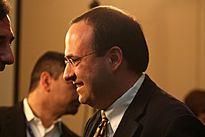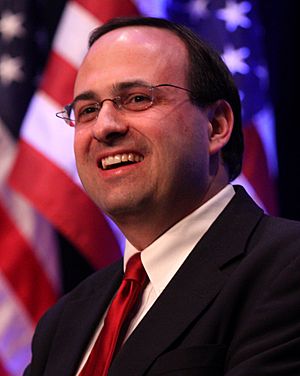Tom Woods facts for kids
Quick facts for kids
Tom Woods
|
|
|---|---|

Woods in February 2021
|
|
| Born |
Thomas Ernest Woods Jr.
August 1, 1972 |
| Education | Harvard University (BA) Columbia University (MPhil, PhD) |
| Spouse(s) | Jenna Woods (m. 2022) |
| Scientific career | |
| Thesis | Ever ancient, ever new: Catholic intellectuals and the Progressive Era (2000) |
| Doctoral advisor | Alan Brinkley |
| Influences | Aquinas · Rothbard · Hoppe |
Thomas Ernest Woods Jr. (born August 1, 1972) is an American author and podcast host. He is known as a libertarian commentator. Mr. Woods is currently a senior fellow at the Mises Institute. He supports the Austrian School of economics, which is a way of thinking about how economies work. Woods hosts a daily podcast called The Tom Woods Show. He also used to co-host a weekly podcast called Contra Krugman.
In 2004, Woods wrote The Politically Incorrect Guide to American History. This book looked at U.S. history from a paleoconservative viewpoint. Some people described it as having a pro-Confederate perspective. His 2009 book Meltdown was about the 2008 financial crisis. Both books became New York Times bestsellers. Later, his writing focused on promoting libertarian ideas. He also supported libertarian political figures like former Congressman Ron Paul. Woods teaches homeschooling courses on Western civilization and government. These courses are part of the Ron Paul Curriculum and are called The Liberty Homeschooler.
In 1994, Woods helped start the League of the South. However, he no longer has any connection with this group.
Contents
Learning and Degrees
Tom Woods earned a BA degree from Harvard in 1994. He also received an MPhil and a PhD from Columbia in 2000. All of his degrees are in history. His PhD thesis became a book called The Church Confronts Modernity: Catholic Intellectuals and the Progressive Era. Woods has said this book "has nothing to do with libertarianism."
Work and Beliefs
Woods is a senior fellow at the Mises Institute. He is also on the editorial board for the institute's Libertarian Papers. He was a founding member of the League of the South, but he has since spoken out against it. Woods was a Richard M. Weaver Fellow at the Intercollegiate Studies Institute in 1995 and 1996. In August 2020, Woods joined the advisory board of the Mises Caucus political action committee. He continues to advise them.
Woods has written 20 books. Two of his books, Politically Incorrect Guide to American History and Meltdown, were on The New York Times Best Seller list. This happened in 2005 and 2009. When he wrote Politically Incorrect Guide to American History, he was teaching at Suffolk County Community College in New York.
Woods' articles have appeared in many publications. These include The Christian Science Monitor, Investor's Business Daily, and The American Conservative.
Woods is a Rothbardian libertarian. He is also an anarcho-capitalist.
What is Libertarianism?
Tom Woods believes in a type of libertarianism called Rothbardian or anarcho-capitalist thinking. This idea says that individual rights, property rights, peace, and the free market are very important. It also says that people should not use force or control others. Woods believes in the nonaggression principle, which means not starting force against others.
Like some anarcho-capitalists, Woods has said his ideas about anarchism are more about philosophy than practical plans. In a practical sense, Woods has called himself a "pragmatic minarchist." This means he believes in a very small government. He also calls himself a Jeffersonian democrat. Woods' view of libertarianism highlights the importance of agorism. This is a belief popular with many libertarians. He also supports alternative currencies like cryptocurrency and precious metals. He believes in political action to reduce the power of the government.
Views on the U.S. Constitution
Woods co-wrote Who Killed the Constitution? with Kevin Gutzman. They believe that the government has gone beyond its powers. They think this has happened from World War I to the Obama administration. Woods supports the ideas of Lysander Spooner. Spooner argued that the Constitution does not have authority because people have not clearly agreed to it. He also believed the government has not followed its rules.
Woods supports the compact theory. He also promotes the idea of nullification. He says that Thomas Jefferson and James Madison supported this idea. In his book Nullification, he explains the history of this idea. He shows how different groups have used it. These groups include abolitionists and those against tariffs. He suggests nullification as a way for states to limit the power of the federal government. Woods supports the Tenth Amendment Center. This group wants states to resist what they see as too much federal power.
Woods believes the Bill of Rights only limits the power of the federal government. He thinks it does not limit the power of state governments. In a 1997 article, Woods wrote that the Bill of Rights was not meant to protect people from state governments. He said states could do what they wished in areas like regulating the press.
Conservative Ideas

In 2011, Woods said he started at Harvard as a "middle-of-the-road Republican." He later became a "fully-fledged libertarian." He has criticized people he calls neoconservative. He used to identify himself as a traditional conservative.
Woods' book Politically Incorrect Guide to American History has been described as having neo-Confederate themes. One book, Neo-Confederacy: A Critical Introduction, says Woods "contends that slavery was benign." The book received strong criticism from commentator Max Boot. Boot said Woods was too sympathetic to Southerners like John C. Calhoun. He also said Woods exaggerated the military actions of presidents like Franklin D. Roosevelt. Woods replied by criticizing Boot. He said Boot represented "everything that is wrong with modern conservatism."
Historian David Greenberg said Woods' book was a quick look at U.S. history. He said it was seen through a "far-right dogma" and was "incorrect in more than just its politics." However, Judge James Haley praised the book. He called it a "compelling rebuttal to the liberal sentiment" in history texts.
Views on Immigration
Woods is against immigration. In a 1995 article, he argued that libertarians were wrong to welcome immigration. He believes that open borders can affect the property rights of homeowners.
Economic Views
Woods supports hard money. He is critical of the Federal Reserve and other central banks. He believes they cause too much inflation and lead to economic ups and downs. Economist Steven Horwitz has noted that Woods' ideas about money are based on a Rothbardian view. This view suggests banks should hold 100% of their deposits.
Woods believes that differences in pay between genders happen for a reason. He thinks women often plan to leave work for a time to have children. Because of this, they might not choose certain high-paying jobs.
Woods has strongly criticized Keynesian economics. From 2015 to 2020, Woods co-hosted the Contra Krugman podcast. He hosted it with economist Robert P. Murphy. The podcast looked at the columns of Paul Krugman, a Nobel Prize winner. They used Austrian economics ideas to show what they saw as Krugman's errors.
Past Connection with League of the South
In 1994, Woods was a founding member of the League of the South. He has been criticized for this. Woods has said the League changed its goals and was not racist or antisemitic when he joined. A 2005 article in Reason Magazine mentioned Woods' past with the group. It said his views meant he was not a libertarian. The article noted he wrote for the group's magazine until 1997. Woods said he did not disagree with most of the views he expressed in those writings.
In 2013, an article from Political Research Associates noted Woods often spoke at neo-Confederate events in the 1990s. It also mentioned his work on the American Secession Project. The authors pointed out that a 1997 article by Woods said he was a "founding member of the League of the South."
In 2018, Woods said the League started as a "decentralist" group. He said it later took a "dramatic" and "vicious" turn toward racism and anti-semitism. Woods explained that the League's president admitted to making a "conscious change" to the group. This change involved "openly and directly addressing the Negro Question and the Jew Question." Woods said this showed the group was different from the one he joined in 1994. He also said that all the PhDs who were at the League's founding had left. In an interview, Woods stated he would not be involved with anything bad. He said he would not apologize because the group he joined was just "nerdy academics" like him.
Views on COVID-19
During the COVID-19 pandemic, Woods criticized public health measures. These measures were meant to stop the spread of COVID-19. He questioned how well they worked. He also talked about the dangers of social distancing, masking, and mandatory lockdowns. In 2022, Woods called for a book to fully explain what "public health" has been doing for the past 50 years.
The Tom Woods Show Podcast
Woods hosts a daily podcast called The Tom Woods Show. He interviews people about economic topics, foreign policy, and history. This podcast started in September 2013.
Awards and Recognition
Woods received the 2019 Hayek Lifetime Achievement Award. This award came from the Austrian Economics Center in Vienna. He also received awards from the Independent Institute and the Institute for Humane Studies. Between 1995 and 2005, he received $8,000 from the Earhart Foundation. His 2005 book The Church and the Market: A Catholic Defense of the Free Economy won a $50,000 prize in 2006. This was the Templeton Enterprise Awards first prize.
Personal Life
Woods is a traditionalist Roman Catholic. In 2002, he married his first wife, Heather. They had two daughters together. In 2020, he announced his engagement to Jenna Laino. They were married in 2022.
See also
 In Spanish: Thomas Woods para niños
In Spanish: Thomas Woods para niños


